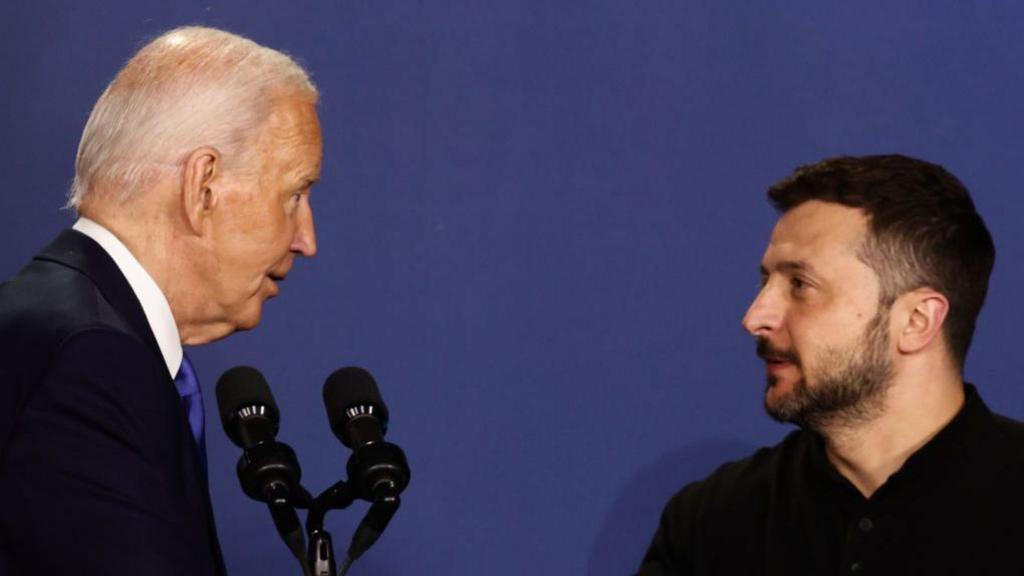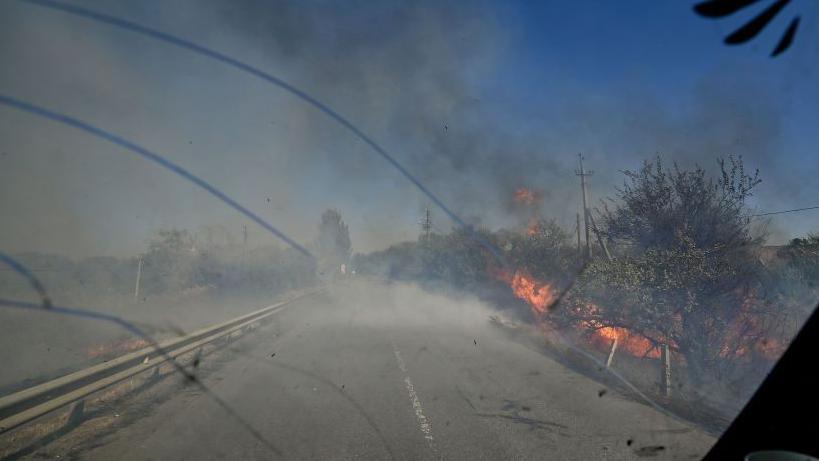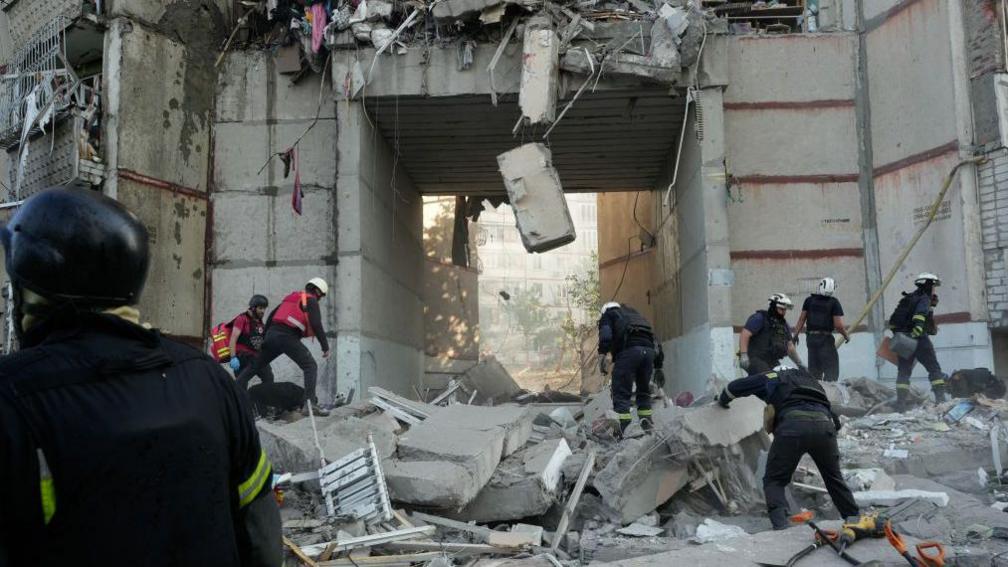Zelensky looks to Biden to back Ukraine 'victory plan'

Zelensky's plan is designed to be a "bridge" towards stopping the war (file pic)
- Published
As Ukraine’s Volodymyr Zelensky prepares to reveal a “victory plan” to President Joe Biden on Thursday, Kyiv is looking to the US leader for a strong show of support before he leaves the White House.
A senior official in Kyiv said they wanted him to “make history” in his final months in office.
While details of the Ukrainian plan have been kept under wraps, the strategy is likely to contain pleas for further military and financial support, plus future security guarantees.
Zelensky says it is designed to be a “bridge” towards stopping the war, which he believes could end sooner than people think.
If the West strengthens Ukraine’s position, he argues Russia’s Vladimir Putin could be pushed into a diplomatic peace.
"This war can't be calmed by talks. Action is needed," he told the UN Security Council late on Tuesday.
Ever sharp at public relations, Ukraine’s president is also aiming to take on critics in the US who have questioned the wisdom of pouring further money into Ukraine’s cause – by promoting an apparent blueprint for eventual peace.

Russian forces have made territorial gains in eastern Ukraine in recent weeks
Zelensky is throwing a huge diplomatic effort behind his victory plan.
He is almost camped out at the United Nations. He spoke on Monday at a debate about how the UN should be reformed. He addressed the Security Council on Tuesday. And he is giving a speech to the General Assembly on Wednesday.
In between, he is meeting world leaders and US politicians. He visited an ammunition factory in Scranton, Joe Biden’s hometown in Pennsylvania, one that is making shells for Ukrainian artillery batteries.
And he is explicit that he considers time is short. In one of his many media interviews, Zelensky told the New Yorker that the victory plan had to be agreed - and Ukraine strengthened - in October, November and December.
“This plan is designed, first and foremost, with Biden’s support in mind,” he told the magazine. That support is by no means guaranteed but Zelensky is staking much on securing it.
That is because the situation will change significantly if Donald Trump were to win the election. At a campaign rally on Monday, the former president mocked Zelensky as “the greatest salesman in history” because “every time he comes into this country, he walks away with $60bn”.
Trump restated his position that he would urge Russia and Ukraine to agree a deal to end the war, one that Kyiv fears would force them to accept territorial losses and no guarantee against further Russian aggression.
It is the fear of such a scenario that is pushing the diplomatic drive behind Zelensky’s victory plan this week. Some diplomats are sceptical the plan would succeed in nudging Russia towards a negotiating table. Much depends now on Biden’s response.
War with Russia closer to end than we think - Zelensky
- Published24 September 2024
'We were surrounded by Russian troops - but escaped'
- Published23 September 2024
Volunteers dying as Russia’s war dead tops 70,000
- Published20 September 2024
Congressional lawmakers will be handed the plan as will Trump and his presidential rival Kamala Harris.
Trump has claimed he would end the war within 24 hours, leading to fears the Republican nominee would essentially force Kyiv into making territorial concessions against its will.
As the US elections loom, it’s a crucial moment for Zelensky as Moscow’s troops continue to press gains, inch by inch, in Ukraine’s east.
A top priority in the so-called victory plan will be to “hit Russia strongly”, believes one military analyst - Mykhailo Samus, director of the New Geopolitics Research Network.
Giving Kyiv the ability to destroy military infrastructure within a 300km range could seriously hamper the Kremlin’s offensive operations in the Donbas and its ability to “neutralise” Ukraine’s ongoing incursion in Russia’s Kursk region, says Mr Samus.
This would mean securing permission, so far denied, to use Western-made long-range missiles on targets deep inside Russia.
While Ukraine has successfully been deploying attack drones against Russian ammunition dumps, missiles can penetrate more heavily fortified munition sites.
The plan will also see Kyiv ask for more of these kinds of missiles, believes Olga Rudenko, editor in chief of the Kyiv Independent.
Further financial support and capitalising on Ukraine’s surprise cross-border push into Russia’s Kursk region are also expected to form core elements within the strategy.
As for Ukraine’s future security guarantees, Ukraine’s aspirations towards joining the Nato defensive military alliance clearly remain.
“Ukraine’s invitation to Nato is part of the victory plan,” confirmed Andriy Yermak, head of the presidential office.

Ukraine's second city Kharkiv came under deadly bombardment on Tuesday
Zelensky’s office has rejected a German report that he is considering a localised ceasefire as “fake”.
However, Czech President Petr Pavel – who has been a vocal supporter of Ukraine – said this week that part of Ukraine would probably remain “temporarily” occupied, possibly for years.
Olga Rudenko believes that, for most Ukrainians, it’s still “too sensitive and unimaginable to concede anything even temporarily to Russia” – even if that conversation is happening somewhere, privately, within government.
“It’s not that Ukrainians are greedy about the territory,” she says.
“We can’t leave our people there, under Russian control and sentence them to those horrors,” referring to persistent allegations of Russian war crimes.
That sentiment was echoed by 31-year-old Dmytro, whose face and arms were badly burned when he was hit by a Russian drone.
“We will not surrender our territories, for which so many people have been fallen,” he told the BBC in Kyiv.
“If we ended the war at this stage, what were we fighting for then? What for did all our men, our comrades die for?”
A truce, he believes, would simply give Russia time to recuperate and Zelensky has likewise warned against a "frozen" conflict.
Dmytro is already planning his return to the front line to fight alongside his comrades: “I will not retreat, I will be there until my last breath.”